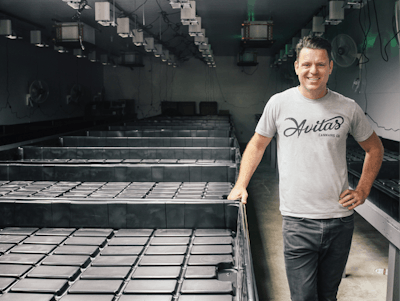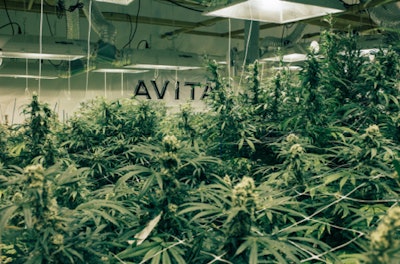
In 2012, Adam Smith left his high-profile career behind (he had worked as a program manager at Microsoft and a senior product manager at Disney before becoming ESPN’s vice president of Global Digital Business Operations) and moved to Washington state on the eve of its legalization of recreational marijuana, under Initiative 502. He and Jason Smit, an old friend of Smith’s who had spent more than a decade growing medical cannabis, quickly filed all the paperwork with the Secretary of State, and Arlington-based Avitas Agriculture was born.
The next year was spent participating in Liquor and Cannabis Board (LCB) meetings: staying on top of LCB rules, along with Department of Revenue taxation rulings and county zoning laws, says Smith. When the latter didn’t quite work out how he hoped (more on this below), Smith opted for a 4,200-square-foot indoor facility under a Tier 2 license for facilities between 2,000 and 10,000 square feet.
After growing his 22-employee operation into one of the state’s highest-grossing Tier 2 producer/processors (at press time), Smith, who is the sole owner of Avitas, turned his sights toward Salem, Ore., where his new 12,000-square-foot indoor growing and processing facility is being finalized.
This issue's Guest Interviewer is W.O.W. Weed’s founder and lead grower Susy Wilson, who is a co-founder of the Cannabis Farmer’s Council, a grassroots, growers advocacy group in Washington, which aims to keep growers involved in the legislative process. Here, Wilson talks with Smith about his path to success, the realities of what success means in the Washington market, things he would have done differently, and much more.
Susy Wilson: You're the second-highest Tier 2 revenue generator among producers/processors in Washington, with nearly $4.5 million in total sales since you started. To what do you attribute this success?
Adam Smith: Some planning, a lot of luck and just adapting to market conditions. I think that's … why we are moderately successful. We've stuck to our core philosophy … that we were going to be a socially and economically responsible company, and we are going to treat all of our partners and employees fairly.
… At the same time, you look at those topline numbers and they sound huge; wow, $4 million. But any profit we made has gone right back into the company to help fund our expansion and to help us with efficiencies.
Wilson: Are you seeing any income from this personally?
Smith: I pay myself a very modest salary. But other than that, we're in this for the long run.
Wilson: What type of growing mediums do use and why did you choose them?
Smith: We started with a hybrid organic and hydroponic method that Smit (who is now our head grower) had used for several years. Recently, we switched over to an all-organic, living soil-based process. …
That change to all-organic processes falls in line with our commitment to create a healthier, more sustainable product line … and offering products that we, as cannabis consumers, would want to consume.
Wilson: Do you employ any automation technology in your Washington grow?
Smith: Our lights and everything are automated from a timing perspective, and we have an irrigation system in place, and that really decreases the labor needed to hand water all the plants.
Wilson: What kind of lighting do you use?
Smith: A mixture of fluorescent lighting for cloning and high pressure sodium bulbs for vegging and flowering.
Wilson: How many crops do you cycle or harvest per year?
Smith: We do a perpetual harvest, so we are planting every two weeks and harvesting every week, depending on the flowering length of the plants.
Wilson: Especially since you grow indoors, have you had any problems with pests or mildew?
Smith: That's actually another reason we moved to this living soil growing medium. A lot of these indoor growing issues are brought about because the environment is so dialed-in and within specific constraints, that if it gets out of that constraint, you deal with really bad pest or environment issues.
This living soil technique is really interesting because a lot of those pests live in the soil, and when you have a natural balance of the ecosystem, none of these issues really ever become big issues.
Wilson: You source flower from other growers to produce your concentrates. Do you only use other growers' products for those?
Smith: We primarily use products from our partner farms, for our CO2 oil line, and that is because we just don't produce enough flower to maintain that product line. We work with some of the best partners in the state and are very proud to work with them. We do use our own flower for our rosin extracts and for hash and keif, and stuff like that.
Wilson: How many different strains do you currently grow, and how many of those are mainstays versus more research and development?
Smith: It was funny: When we first started, I had this grand plan about how we were going to have eight strain mainstays … and four rotating strains that we would have as R&D, or as limited-edition or seasonal strains. But it didn't work out that way because of market demands.
Some strains we started with were really popular, and some weren't; so we … started new genetics for different things, and we've gone through pheno-hunting for stabilized genetics of specific strains. It's become a much more fluid situation. But that's just for us to keep searching for new products to keep things fresh and trying to grow the best product we can.
Wilson: Do you or your employees track data throughout cultivation? How do you use the data?
Smith: I'm kind of a data nerd, so we track everything. And the same thing for Jason [Smit]. His background is actually in aerospace engineering. He was a composite materials engineer prior to being a full-time grower. So we track everything from the climate to yields to outdoor temperatures. … The same thing goes for all the stuff we process. Whether it's our CO2 extraction yields, our packaging rates, our efficiencies from a packaging perspective.
We use all that business data to form performance indicators to see how we are operating from an efficiency standpoint, so we can manage our costs.
Wilson: What have been some lessons you've learned the hard way?
Smith: The biggest challenge honestly has been that we made business plans based on things the Liquor Control Board and our local governments told us were going to happen. And those things have been changing … and have a dramatic impact on the planning we can do.
When we first applied for a license, we were planning on building greenhouses on our front property, and we initially applied for a Tier 3 license. Because we didn’t have the facilities built, we were limited to applying for the square footage we had already constructed.
So we applied for and got our Tier 2 license. Now, of course, they are not issuing any new licenses [to existing licensees], and we are stuck at a Tier 2 license [unless we] buy another company or purchase a license.
Wilson: And even worse for you were zoning issues. ...
Smith: Yeah. When we applied, our zoning allowed for us to build greenhouses. [By the time] we put our permits in to the county so we could start expanding on this property, they said, “We are not accepting any more building permits for marijuana companies because the county is going to vote on a moratorium in November.”
And, of course, in November, the county put a temporary moratorium prohibiting any expansions or new marijuana businesses on R-5 [zoned Rural 5-Acre] property. Then in January 2015, they put that moratorium into permanent effect. So we got double screwed.
Wilson: What have been some unexpected costs during your build out and launch?
Smith: Certain costs … were a lot more expensive than we thought — the professional services fees: our various lawyers, accountants, those types of things. Along with all the costs of staying into zoning compliance and updating our facilities based on zoning changes. The effort that managing those things took was shocking to me, honestly.
The other thing is … where everybody … is knocking on our door, saying, “You guys owe us thousands of dollars.”
Whether that's the city of Seattle for business licensing because we deliver to stores in Seattle, or the Clean Air Agency, or the Department of Ecology for our waste materials.
Wilson: Are you growing predominantly for medical or recreational sales or both?
Smith: We're pretty much focused on recreational simply because it's not really clear what's going to happen with the medical market yet. We are … tentatively watching.
Wilson: I think a lot of producers, processors and retailers are holding back to see how it is going to roll out, unfortunately for medical patients. On to a different topic: Is there anything you would've done differently if you could start all over again?
Smith: I think … we would've waited … to actually go into business. As this market matures, the business environment gets better in some ways. Obviously when we first started, we had that 25-percent producer/processor tax, which just killed us.
Being among the first to be licensed, dealing with local jurisdictions was very difficult because they didn't have zoning things in place … [or] processes for dealing with permitting. So we were trailblazers, … running into all the red tape and hoops we had to jump through because they keep changing their minds on things. So there were a lot of expensive re-dos … in the beginning that I don't think people face now.
Also, when we first started in 2014, there were … I think, like 10 times as many growers as there were stores. The ratios are still out of whack considering ratios in other states, but it's better. …

Wilson: What is the largest issue you see facing the legal recreational cannabis market?
Smith: The race to the bottom in pricing. That's really the thing that is going to make or break this industry. …
We live in the land of Starbucks and $8.00 fair trade coffees and … the organic movement and sustainable, responsible business practices. It’s frustrating to see why the marijuana industry is not taking that approach that so many other industries that have come up in Washington or in Oregon have embraced fully.
I'm not advocating ridiculous pricing, but I am advocating responsible pricing for sustainable business, and I think that with this ultra-obsession with low prices, things will get out of whack and are starting to drive some pretty bad business practices and decision-making.
Wilson: Now that you are in the Oregon legal recreational system, what are some of the main differences you see?
Smith: Allowing vertical integration in the market is huge. It has its own set of challenges, but I think it creates a lot of different business opportunities.
Wilson: Absolutely. Do your plans for expansion into Oregon include retail sales of your product?
Smith: We’re looking into it. It's really difficult to find a retail location in populous areas in the state. … I would love to have a flagship retail location.
Wilson: There has been action to start a Cannabis Commission with the Department of Agriculture (DOA) in Washington, D.C. Cannabis growers will have to vote on this to get the process going with the DOA, and one outcome will be that cannabis cultivation will be designated as agricultural, which it is not considered yet in Washington state. Do you see that as important to the future of the legal grower in Washington state?
Smith: This whole conversation of whether growing plants for commercial purposes is considered agriculture is extremely Orwellian. You have a government redefining what a plant is and redefining what agriculture means. If you grow poinsettias or mint, and you sell them, you're agriculture. If you grow marijuana and sell it, you are heavy industrial. What? That doesn't make any sense.
It’s also extremely important for us, as growers, to get together and start putting in place standards and classifications that all other agricultural industries have done in order to promote, to advance and to improve the quality of the industry and the products we are providing.
So, it's extremely important that people support the formation of the Cannabis Commission.

















